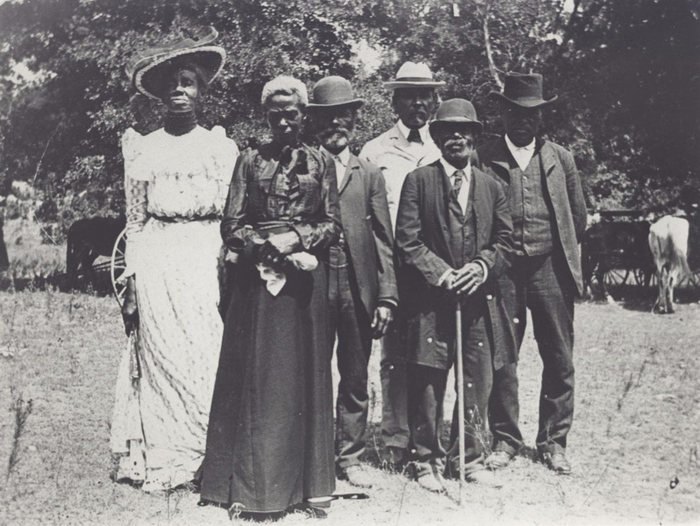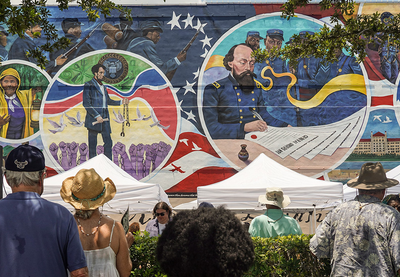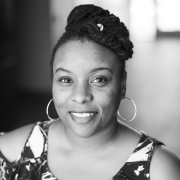Numerous events and activities are packed into Juneteenth celebrations this year in Galveston, Texas. Over three weeks, residents have their pick of festivals, a gospel concert, galas, a business summit, freedom tours, reenactments, a parade and more.
June 19, 1865, marks the announcement to enslaved Black Texans that they were finally free—two and a half years after Abraham Lincoln issued the Emancipation Proclamation, and two months after the Civil War ended. Last year, President Joe Biden signed the Juneteenth National Independence Day Act—codifying a holiday officially observed in Texas since 1980. This year’s observance holds deeper meaning in confronting the efforts to obstruct the teaching of honest history.
But questions about Juneteenth linger: How does this originally Texan commemoration affect us all, and how might it inform our next steps in creating a just society?
Substance or Substitute?
In Galveston, residents are happy that Juneteenth is getting national attention but don’t want the holiday to become a substitute for confronting the effects of slavery. The story of Juneteenth—enslavers continuing bondage after Black people were to be freed—exemplifies issues of power that continue today.
“Many folks are just really pleased to have it recognized as a national holiday, and that in and of itself is meaningful,” says Carol Bunch Davis, Ph.D., professor and assistant vice president for academic affairs at Texas A&M University at Galveston. “I tend to be a little bit more skeptical, I think, about those sorts of things, because I think almost instantaneously the conversation became, ‘OK, now you have this holiday, so what else do you want?’”
Black residents want, as Davis explains, equal opportunity and a true reckoning with their local history. “It’s great that we have a history of Black people in Galveston who have always celebrated [Juneteenth], but how does it reconfigure or inform the way that we think about the city’s identity broadly?”
Teaching the Honest History of Juneteenth
The national spotlight on Juneteenth is an occasion to explore Texas’ short yet brutal history of slavery.
Galveston Island was the site of a bustling illegal slave trade long after the abolition of the importation of enslaved people in 1808. The island, a Mexican territory, was a safe port for pirates, who’d ransack vessels carrying enslaved Africans in the Caribbean and raid other smugglers on the Gulf of Mexico. White settlers later gained independence from Mexico and formed the Republic of Texas in 1836, primarily to continue slavery, which was being abolished in Mexico. It’s important to point out that similar to the Civil War’s Lost Cause narrative, Texas’ Battle of the Alamo is also a whitewashed version of history that paints Texas settlers as heroic champions of freedom.
Fast-forward to 1865 and the end of the Civil War, when enslavers ignored Lincoln’s Emancipation Proclamation, just as settlers had ignored Mexico’s attempt to end slavery in its territory. Finally, in late June, thousands of Black Union soldiers, and Army Gen. Gordon Granger, arrived in Galveston and other Texas cities to force compliance with the law. This is American history.

Teaching history honestly in schools is under threat through numerous legislative efforts— including the 2021 law in Texas—that aim to obscure and limit how the history of slavery and the Black freedom struggle are taught. It’s rare to find a textbook chapter dedicated to Juneteenth and its historical significance. And by June 19, most schools have finished for the year, so commemoration doesn’t easily fit into academic calendars.
It’s possible, however, to uplift hard history beyond classroom walls. “We need to find creative ways of doing that,” says Sue Johnson, executive director at Galveston’s Nia Cultural Center. “And we need not be afraid of pushback from critics of the distorted view of critical race theory. We need to move despite all of that in new and innovative ways of getting those messages across but being intentional and consistent.”
The Nia Cultural Center employs storytelling through art, history lessons and programs for youth. The center’s Juneteenth Legacy Project Headquarters was established primarily to teach the complete African American story and advocate absolute equality and collaborative growth.
“We need to finance those kinds of programs, and we need to do them in every space we find available—churches, community centers, homes, homeschooling curriculums, where we have control over what we teach,” Johnson says.
Avoiding Myths and Whitewashed History
Juneteenth is symbolic of America’s struggle with progress—often opposed or delayed. We must remember—and teach—that the Emancipation Proclamation of 1863 didn’t end slavery in the United States, as it applied only to Confederate states. Slavery was officially abolished in the U.S. on January 31, 1865, when Congress passed the 13th Amendment. However, people were still enslaved in Delaware as late as December 6, 1865, the day the 13th Amendment was ratified.
As mentioned in “Teaching Juneteenth,” Black Texans have long observed the holiday in solemn and festive ceremonies. This day provides a safe space for Black people to celebrate culture and embrace community building without the white gaze. Celebrations have also included concerted efforts to organize citizens politically and uplift hidden histories.
To many Black people’s dismay, the commercialization of Juneteenth, now that it’s a national holiday, has already taken hold. Observants insist we center the formerly enslaved and their descendants—not sales—in this American story.
They also caution against erasing Black people’s participation in their freedom. For example, Gen. Granger is centered as a heroic figure who rode into town to inform Black Texans of their freedom. Yet, several regiments of the U.S. Colored Troops who accompanied him are rarely included in this narrative.
Stories of Black people’s roles in their freedom are often buried or obscured, so it’s no surprise that many, even Galveston residents, didn’t know this bit of history.
“I didn’t know until, oh, I guess it’s been about 15 years ago that there were actually Black soldiers with [Granger],” says Tommie Boudreaux, author and retired Galveston educator. “And I’m born and raised here in Galveston, but I didn’t realize that. But those things, it takes a lot of research.”
It’s essential to credit Black people who campaigned to make Juneteenth a holiday—first, Black leaders in Galveston, and then former Texas educator Opal Lee. Lee elevated the history of Juneteenth for decades and then, at 89 years of age, walked to Washington, D.C., to advocate for a national commemoration. She was with Biden when he established the federal holiday.
Seeking Absolute Equality
A historical marker stands on the corner of 22nd and Strand streets in Galveston, where Granger read General Order No. 3. Last year, artists unveiled a 5,000-square-foot mural, which prominently features two crucial words from the order—“Absolute Equality.”
Juneteenth can serve as a reminder to fight for absolute equality, as it has yet to be realized.
People of color in Galveston, angered by recent redistricting in the county, which would strip the political power of Black and Latine voters, point to the need for action beyond commemoration.
“I don’t want us to be distracted and lose focus of … the redistricting issues impacting Galveston County right now,” Davis says. “Right now, this historically Black district for the county commissioners court is basically being overhauled, and it’s not going to be good in terms of representation.”
She adds, “There are some really glaring inequities in Galveston … no amount of celebrations, or mural unveilings …. are going to right those inequities. They can educate people about historically what has happened here, but those are not the things that will meaningfully address those issues.”
A natural disaster also exposed inequities. Davis recounts how Hurricane Ike affected Black residents in 2008, opening the path for displacement and gentrification. It’s similar to what happened in New Orleans after Hurricane Katrina swept through the city in 2005. Debates ensued on whether leaders should rid Galveston of public housing.
“Right now, public housing that was destroyed during the hurricane is just now being rebuilt,” Davis remarks. “That was in 2008, and this is 2022. The population of Black people in Galveston diminished greatly after that storm.”
“The city’s encountered a lot of gentrification, and thus our history [is disappearing],” Johnson concurs. She illustrates a stark image of what is lost in explaining how she would describe the scene on a tour: “In this empty lot, there used to be Booker T. Washington Elementary School.”
Erasure is evident in other spaces. Few historical markers tell the story of Black life in Galveston compared to the number of monuments, street names and buildings tied to the maintenance and expansion of slavery in Galveston.
Boudreaux, who serves as the Galveston Historical Foundation’s African American Heritage Committee chairperson, was raised in segregated Galveston. She notes the city appears more segregated today than when she was growing up. She’s troubled by the current social and political upheaval. Nonetheless, she’s hopeful that change is imminent as young activists of all races and backgrounds rally for social justice.
“I hope it doesn’t take another 40 years for some things to improve,” she says. “But yes, I see positive things going forward.”
It is very challenging for us to accept that this is an aspect of who the country is, and that white supremacy and anti-Blackness have shaped much of what we see in the current moment.
— Carol Bunch Davis, Ph.D.
Connecting 1865 to the Present
Acknowledging that enslavers delayed freedom for two and a half years reminds us that powerful systems dehumanize Black people—even while supposedly realizing their rights. (It’s worth noting that many enslaved Black Texans knew about their impending freedom years prior.) Recognizing this pattern helps us better address systemic racism today.
Davis perceives current debates around teaching history, voter suppression and local political struggles as a continuation of oppressive ideologies that have manifested in various ways throughout U.S. history. She argues the vestiges of slavery will continue to haunt us if we view current discourse in isolation.
“It is very challenging for us to accept that this is an aspect of who the country is, and that white supremacy and anti-Blackness have shaped much of what we see in the current moment,” Davis contends. “Until we wrap our heads around this [as] a foundational aspect of this country, it’s going to be difficult to make meaningful changes.”
Johnson identifies the erosion of civics education in schools and elsewhere as detrimental to us all. “I think people think we’ve overcome and the kinds of things that are happening now couldn’t happen,” she argues, citing the continued fight for voting rights.
Celebrating Juneteenth Outside of Texas
Texas isn’t the only place where Black people have commemorated emancipation. And it’s not the first. An emancipation celebration has occurred annually in Gallipolis, Ohio, since 1863. And New Year’s Eve Watch Night services at Black churches have continued the tradition since “Freedom’s Eve” on the night of Dec. 31, 1862.
Juneteenth offers a moment for those who envision a just society to elevate and support the ongoing freedom movement no matter where they live. It opens possibilities to do the real work of uncovering honest history—and to be honest with ourselves, especially in the wake of racial violence.
“I hope that we will use this as an opportunity to really be honest about the meaning of an event like that terrible tragedy in Buffalo,” Davis says, “what it means to be so far away from 1865, but also in some ways not very far away at all from it.”
Johnson says there is a need to heal from slavery and calls for solidarity among Black people to thwart “divide and conquer” tactics from those in power. “Staying vigilant, staying ready, preparing young people for the battles ahead to not only maintain our place as humans but this country as a democracy is so important,” she notes. “[We need] more time and effort to make people aware of how fragile it all is.”

